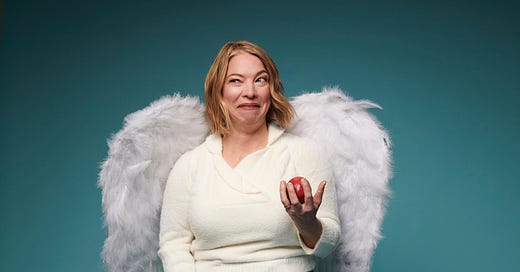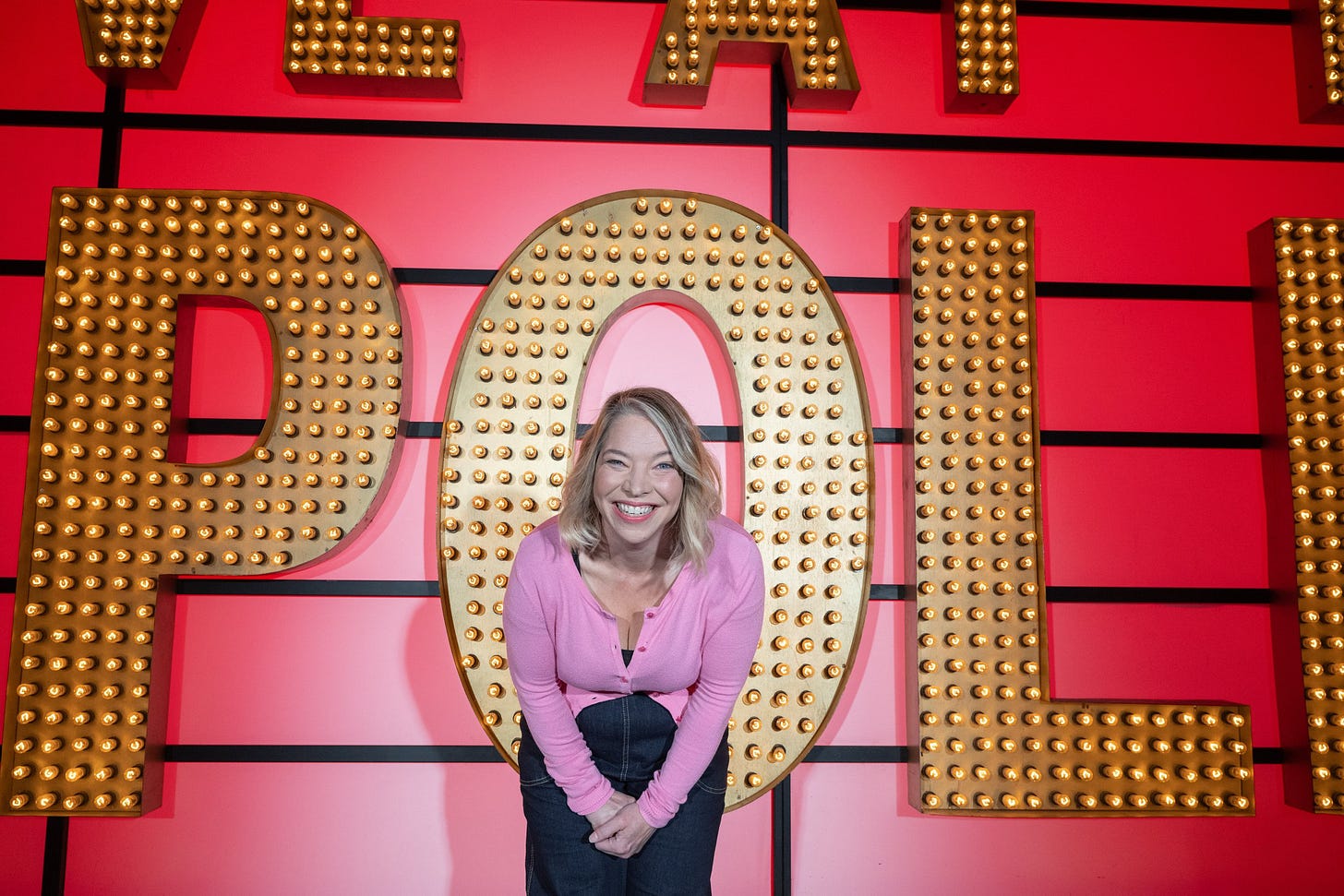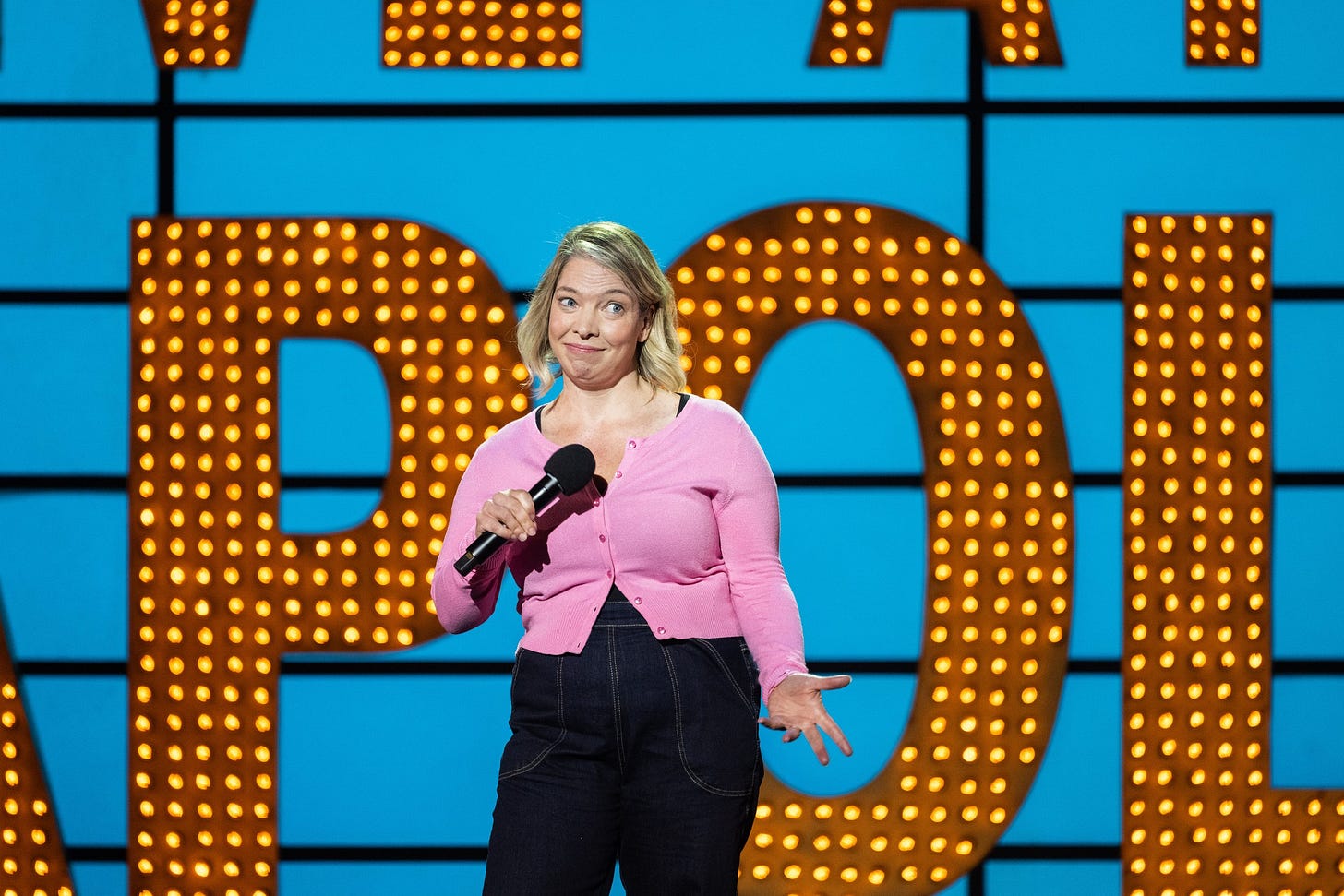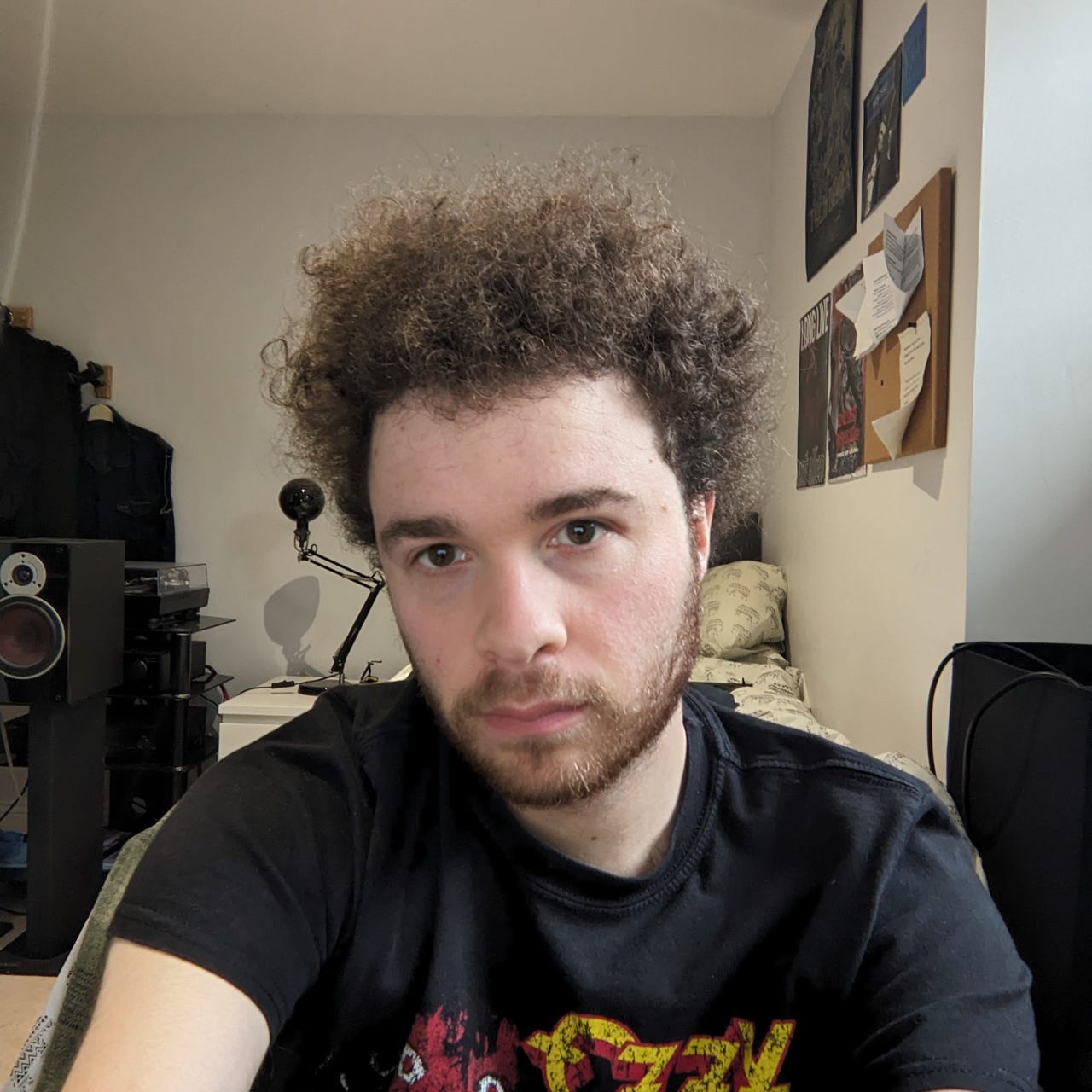Interviewing the Superb Spring Day
Spring Day is an American stand-up comedian living in London. She’s made several television appearances, including a performance on Live at the Apollo.
Spring Day is an American stand-up comedian living in London. She’s made several television appearances, including a performance on BBC2’s Live at the Apollo in 2023, and Rosie Jones's Disability Comedy Extravaganza. As an actor, Spring appeared in the BBC3 sitcom Jerk, and she’s written for Horrible Histories, and Audible’s comedy musical – Crush Hour.
I can’t really talk about Spring’s Apollo performance without resorting to confusing… And frankly nauseating levels of autistic enthusiasm. I’ll just say this - she’s bloody brilliant. There, done. What do you mean my whole body is shaking? I’m just saying she’s pretty good/the best etc. I hope this email finds you well. Regards…
Anyway, the interview.
I spoke to her a few days before two dates at the prestigious Soho Theatre in London. Her latest show, Exvangelical, is about joining a Christian cult at age 13, which she left 13 years later.
*Audio below the article
You’ve achieved many things in the past few years. Do you feel you’re at the height of your career?
I think I’m at a high point, but hopefully, I’m not at the highest. I’m just happy to be working. I’m happy that people are inviting me to do things and pay me for them. I try to focus on what I have control over, which is writing every day and trying new stuff, working on the craft. You have to look at it as a bonus because if you go out expecting things, you’re going to be disappointed.
I know what you mean. There’s this video game I play and if I win a game, I lose the next one. I get cocky.
Playing video games is really, really helpful in the comedy and entertainment world. It reminds you that it’s all a game. Sometimes you win and sometimes you don’t but there’s always another game. It desensitizes you to failure a little bit.
You need to be comfortable with failure. This is something I had a really hard time with. There are many artists in my family, but their perception of an artist is that you come out of the gate hitting home runs. And that’s just not how it works. You need lots of room to grow and learn. I discovered that on my own after I left America. I had to stop listening to people who don’t do comedy.
You’ve got a lot of experience. If anyone knows it’s you.
Yeah, but it’s a weird business. There are so many paths you can take. I had trouble accepting help for a long time. People who don’t struggle to ask for help get support.
There was a study in the States; it showed that people who need help don’t ask for it, and those who don’t are very comfortable with asking. There’s no shame in it; it’s just a psychological thing. Everybody has to, and nobody’s an island.
By the time this is published, you’ll have performed two dates at the Soho Theatre in London. How are you feeling about that and how familiar are you with their venues?
I’ve been to a few shows in the past, including some in the room I’m performing in. So, I have a general idea of what it might feel like. It’s not stadium seating, it’s fairly intimate which is what you want with this kind of show.
“I know the Soho Theatre are curators of things they find interesting. So, it’s really nice to be asked to do shows and to be thought of in that way.”
After Edinburgh, I was thinking about other formats for the show, including turning it into a book. Some reviews said I glossed over certain things, but you only have an hour! I was thinking about fleshing it out, although they’re happy for me to do the same hour of material.
I’m excited and nervous, but someone told me a long time ago that the two emotions feel the same.
I heard a sports psychologist say you can overcome nerves by reframing it as excitement in your mind…
What’s it like back-stage at Live at the Apollo and how did it feel to perform on the show?
That was really exciting. When they told me they were considering me for the show I said “Oh, that’s a nice thing to say.” Lots of people say nice things in this business and you can’t hold your breath. You just have to get on with your day.
So, I knew fairly early on that I was being considered. It was still a pandemic-y time so I wasn’t super comfortable with going out, but I already knew what I was going to do. I didn’t have to change much of the language, only one person’s name for legal reasons.
I remember repeating my set over and over again, pacing in my flat. You do 20 minutes and I’ve seen a lot of people go really fast. And they’re not really enjoying it, but I understand why. Plus, you’ve got all this room to pace on the stage, and there are so many people; nearly 3,500.
I like talking to nerdy sound-engineers and they told me about the delay in the sound reaching the audience. So, I didn’t want to get excited and jump the gun, and go at 1.5 times my normal speed. I decided to lean into my hometown accent knowing it would slow everything down.
I was talking to my dad a lot around that time and you go back to your hometown accent when you speak to your parents. At the start of the set, I leaned into it fairly heavily. My husband (Tim Renkow) greeted me after the show and said “Well, it was nice to watch your dad at the Apollo,” ha-ha. But I transitioned out of it towards the end.
I was asked when I wanted to go and I wanted to go first. I just wanted to be done with it, in a way. Tez Ilyas went on a little longer than planned, so long that the smoke dissipated and they had to add more. But I was really lucky he did because I was having a mini-panic-attack and thought I might faint.
“I said ‘Spring, pull yourself together. You’re gonna go out there looking like Bridgette Jones’s Tom Sawyer, and you’re gonna do your jokes and f**king get the job done.’ ”
You nailed it. It was amazing.
It was an out of body experience.
My husband has done the show before and he said “You can’t see anybody and they can’t see that you see them.” He totally lied. You can see everyone, it’s lit up. It’s 3,000 people and none of them know who they’re going to see. They just get free tickets and know they’re going to see someone on the telly. And they’ve probably been drinking since they got there.
They announce me, I come out and 30 or 40 people get up to go and use the toilet or something, but not all together. 3,000 people is more than the town I grew up in and, I suppose, at any given time, 40 people are gonna need a p*ss. It’s not a personal thing, it’s crowd management. I was really proud of myself for not taking that personally. Years of doing the fringe and watching people dig in their bags and conversing with each other; it toughens you up for that sort of thing.
You got some huge laughs. That’s what I took from it. I thought it was great.
Thank you.
The show calls for snappy setlists that cover various topics in a brief but satisfying way. How did you approach that challenge?
A writer once taught me that everybody’s favourite thing, is for you to talk about them - the audience. I’m not English, I’m a transplant and as far as I understand, the show is for people who live in the UK. And there’s no shortage of American representation on the television and the internet. So, I talked about my observations and my experience living here. Why else was I there if not to make their lives feel seen and recognized?
Plus, I feel like a bit of hometown smut goes down well on the show. So, a little married sex story. It might have been risqué back in the day but it’s quite tame now. So, I had that.
Plus, I enjoy talking about cultural differences and dysfunctional families and difficult relationships with parents. I talked a little bit about disability but I tried to not let it overwhelm my set.
I was concerned people wouldn’t be able to notice that I’m disabled and then I saw myself walk out on stage and thought “No no, they got it.” Ha-ha. But I tried to keep that down to 20% of my set.
Do they let you choose the music you walk out to? I’ve wanted to know for ages.
That’s a really good question! You have to choose from what the BBC has licence to use. The only problem is, they don’t know until you tell them the song you want. A British artist is a pretty safe bet. So, you send them a list and they come back and tell you which ones are good to go.
The first time my husband did it, he kept suggesting songs they couldn’t use; indie bands who probably haven’t even signed anywhere. I think he went with Iron Maiden in the end, which is a pretty safe bet.
I was really happy with my choice - Boys Want to Be Her by Peaches. It’s an obscure song. I was looking up “power/rock/women” ha-ha, y’know to rev up a crowd. I also looked up what other people chose and wanted something that would stand out. That song is obscure enough, but it also ought to be heard more
I think it’s nice to come out to something you like that’s underrated. I’ve spent far too long thinking about what it would be if it was me, ha-ha.
Ha-ha, but they don’t play it for very long. It’s surprisingly short. It’s also sensory overload and, it’s weird that we give it so much thought because people don’t remember it.
You were born in the US, moved to Japan and settled in the UK. Is travel important to you?
Travelling to places where I can get around is important to me. In terms of my disability,
“I’ve always needed to live in a place where I don’t have to drive. So, I hyper-focused on living in Tokyo when I was a teenager.”
And I wondered what I could offer them. I wanted to be a missionary and thought I could teach English. Being an English teacher in Japan is like being an estate agent here. It’s just what useless people can do and be of some use. Some people are really good at it and some aren’t. I think I was somewhere in the middle.
I’ve just remembered they have the Bullet Train in Japan, so their public transport must be good.
The public transport is good and the people are nice. They have such an elderly population, so accommodations are made for that. Being mildly disabled, it’s much easier to get around. Plus, people didn’t notice my disability right away. They just assumed it was a cultural difference. When I’d shake their hand with my left, they’d say “Aw f*ck, I’ve been doing it wrong all this time” and I’d say “Well yeah, you have.”
I met most of the other English teachers. Most of them are from the UK, with well-stamped passports. They said I should check out the UK; because you don’t have to drive there either. I started doing comedy in Japan at this time.
Could you talk about the Japanese comedy scene? I heard you performed at the Comedy Store there. I didn’t even know they had a Comedy Store.
Here’s the thing about the Comedy Stores around the world – none of them are related. It’s my understanding that the London Comedy Store took its name from the LA Comedy Store, and because the internet didn’t exist at the time, no one questioned it.
A couple of expats started the Tokyo comedy store and it was mostly improv in the beginning.
“Tokyo Cynics” was the stand-up arm of the company. It was a collaboration, so the first part of the show would be stand-up and the second part would be a lot of improv. But several years in, the people that took over said actually, we kind of hate stand-up, ha-ha. Thankfully, by then there were lots of other stand-up shows going on.
Roughly half of the audience would be Japanese and dating a foreigner. You talked about cultural differences, and the stresses of living in a different country with lots of rules. The material and a lot of our conversations were about that.
In some ways Japan is a bit like being in the TV show Mad Men. There’s a lack of progressive ideas. So, in some ways it can feel old-time-y, but if you work for a company, you have job security in a way that nowhere else does in the Western world anymore.
I thought about going into the Japanese-speaking comedy scene, but I couldn’t pursue it because I had student debt to pay for. I spoke to an Australian man who did, and it turns out you get paid very little for years and years. They have comedy “stables.” If you want to understand that, there’s a show called Jimmy: The True Story of a True Idiot on Netflix. It’s not very PC.
So, you join these stables and they teach you how to be funny and tell a joke. They tell you there’s one way to do comedy and sort of choke the uniqueness out of you.
That guy is raking in money now, but only by working behind the scenes. In the UK and America, the talent gets 80% of the money and the management gets 20%. In Japan it’s the other way round, and the management there will often own your name and all of your material, and tell you all the things you can’t say. So, people get wise and start working behind the scenes instead.
There are exceptions to these rules, but they’re usually Japanese comedians from within the system. So, if you think you can come in as a foreigner to disrupt and sort of “white knight” their comedy scene, good luck, man! They don’t exist for your sake. But if you genuinely love the market there, you can find a way, but you have to play by their rules.
The UK is surely the least sunny place you’ve lived in. Don’t you miss the warmth?
Not really, because I’m from the Midwest of America. Brits are worrying about cold snaps and ice storms at the moment, but to me that’s just winter, ha-ha. You guys have never had winter here.
I appreciate how you can go out in the “bad weather” here. It’s consistently fine in my view. I find relentlessly sunny climates oppressive. It’s like being in the movie Midsummer; I don’t trust it.
Your humour is sometimes described as “dark comedy for nice people.” Is intention all that matters regarding dark jokes and their morality?
“Yes, I think so. My comedy is about making painful things palatable.”
You’re always going to have that trauma, so you might as well do something useful with it. Somehow it makes space for other pursuits. Ignoring it doesn’t help, nor does pretending it didn’t happen.
I don’t know if you’ve ever been “roasted” before. The fear is that somebody will say something absolutely horrible, and everyone’s going to agree with them. What actually happens, is they say something that you’ve often thought to yourself, but when it’s said out loud it sounds stupid. Suddenly, the power it had is taken away. It evaporates.
Has the new show transformed your relationship with those experiences?
Yes. I feel that the show discusses the situations, and the people involved in the best possible way given what happened. I can move on from the show knowing that I’ve done my best to respect those people, and the parts they played in my life. I can talk about other things.
I’m glad it’s been useful in that way.
My only addendum is - you try to paint a respectful picture and highlight things that you want people to know, and you can put it together quite neatly, right? But the people you’ve talked about don’t know you’ve done this, and they’re still in your life.
So, when they do something really stupid, you’re reminded that part of the show’s theme isn’t over. It’s not a “They lived happily ever after” situation. It’s more complicated than that. The brain seems to like stories with a beginning, middle and end, and it likes to think situations resolve.
What do people most commonly say when they compliment your comedy?
That’s a really interesting question. The compliments usually say more about them than what I did, ha-ha. I usually get “Oh, you’re a top lady” and I don’t know what I’ve said that would make them think I’m a lady. They might say “Oh, this is great for disability awareness” and I’m like, “Okay, fine,” ha-ha.
If they say “This meant something to me” or “it spoke to,” it feels like I’m involved, but anything beyond that has both something and nothing to do with me.
I think compliments can often be patronizing and people don’t realize.
Yeah, they don’t realize and it’s not your responsibility to educate them. I’m also mindful of the fact that they’re trying to be nice. On the rare occasions when I’ve met my heroes, I’ve said “I really appreciate your work” or “Your work has had a big influence on my life,” and “thank you very much.” Anything more than that is too much of a burden for them to have to listen to.
What are your career plans for 2025?
I’m working on writing a TV show that I’m very proud of. A production company have said they might like to make it.
I just want to keep cranking out stand-up that I’m proud of, and also figure out a way to do social media that doesn’t make me want to off myself. To do it in a way that is beneficial to me in finding my audience, without taking over my life or causing a mental health crisis.
It’s so overwhelming.
Incredibly overwhelming and it’s designed to be that way. I feel like I’m sitting in front of a slot machine most of the time. I’m close to wearing a diaper. I don’t even care about the likes, I just want to know how many people saw it! Ha-ha.
Below, there’s a clip of how the interview ended, followed by the full interview. I was saddened to say goodbye, but I look back on the meeting very fondly and I can’t wait to see what she does next.
Audio
You can read more about Spring on her website, and click the links to follow her Facebook and Instagram account. The full audio recording is below.








Thankyou Dan. I really enjoyed reading the interview. Excellent questions.
Thoroughly enjoyed reading this, thoughtful questions Dan 💜